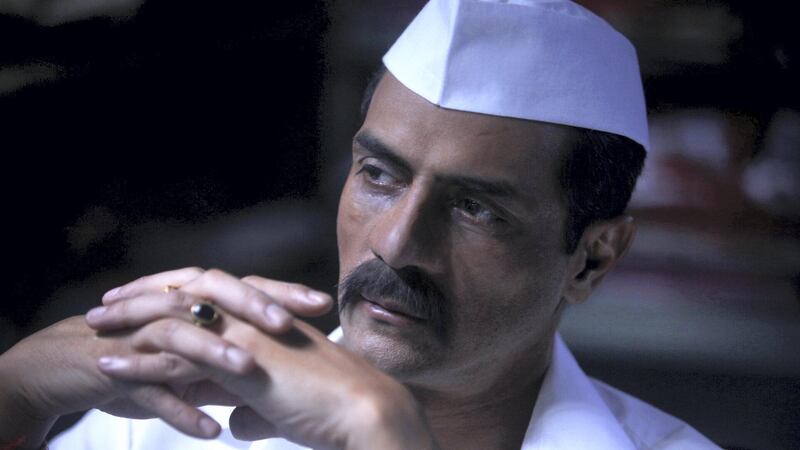US network CBS may have cancelled its latest remake of Neil Simon's 1965 play The Odd Couple, which starred Friends' Matthew Perry alongside Baywatch co-writer Thomas Lennon, but Bollywood could have thrown up an ideal replacement in the film Daddy, which hits cinemas this weekend.
The film tells the story of the renowned Mumbai gangster-turned-politician Arun Gawli and brings together the unlikely pairing of festival-circuit darling director Ashim Ahluwalia (Miss Lovely, John and Jane) – an outspoken critic of the Bollywood star machine – and Bollywood golden boy and former model Arjun Rampal, who wrote and stars in the film.
It's a fascinating convergence, and one that Ahluwalia hopes can bring something fresh to Indian cinema: "I don't think of this film as a Bollywood movie at all," he insists.
"I feel like it's a totally new category, something that's never been done before. The only reason people say it's Bollywood is because Arjun's in it, but he's unrecognisable in it with all the prosthetics. It's just the way things are marketed. We only have two genres of film in India, 'Bollywood' and 'Regional'. You really don't have genres. I'm really proud of this film and feel like it's my film. I don't feel like I went and did a job for a studio or something."
The contradictions don't stop with the film's key architects. Gawli is himself a divisive character – a convicted criminal who still sits in an Indian prison, yet commands a dedicated fan base in his home city, and garnered sufficient popular support to form his own political party, Akhil Bharatiya Sena, and win an election to Mumbai's Legislative Assembly in 2004.
The irony is not lost on Rampal: "I get asked if I'm glorifying him but the fact is these incidents happened," he says. "There are things he's done that made him a hero in some people's eyes, you can't avoid that fact.
"I don't need to glorify him. We weren't making some propaganda thing, we were actually careful about what we put in because we didn't want a propaganda film."
Rampal likens Gawli to flawed folk anti-heroes such as London's Kray Twins, Chicago mobster Al Capone or the Colombian drug lord Pablo Escobar, all of whom have been the subject of films themselves.
And therein lies another divergence between the film's star and its director – while Rampal cites movies like The Godfather, Goodfellas and Scarface among his favourites, Ahluwalia says he's not a fan of Hollywood's gangster movie output: "I always felt The Godfather was overhyped," he admits, risking the wrath of cinema purists the world over. "From a director's point of view, that is. From an actor's point of view it's great but I felt those characters were too aspirational."
The director says he has turned more to Asian films for his inspiration, in particular Japanese cinema.
"I love Vengeance is Mine, the [Shohei] Imamura movie. It's about a serial killer but it has these multiple viewpoints. He's almost not a villain, he's just a product of Japan, and Arun [Gawli] is the same. He's a product of his society, he wasn't born a criminal.
"That kind of thing interested me as a director, that more varied moral pallet. I much prefer the Japanese stuff, the Yakuza movies and some of the Korean stuff. It's just a bit more weird and a bit more crazy. Some of the South American stuff too, Mexican gangster movies. It's a bit more grungy, a bit more Indian I guess," he says.
For Rampal, the making of the movie has been something of a pet project – he spent about three years in pre-production, meeting with Gawli and his friends and family to help with his script-writing duties, and gained the family's blessing for his project – there are even unconfirmed rumours of Gawli being released on parole for the premiere.
___________________
Read more:
[ Film review: Shubh Mangal Saavdhan is sensitive, witty, and inoffensive ]
[ Indian TV: where men and monsters rule ]
[ Film review: Babumoshai Bandookbaaz is a gangster drama that's torn in two ]
___________________
He admits that it wasn't an easy process. "It wasn't something where you could just adapt a book, or you already knew the story," he says. "I had to find people who were survivors of that time who were alive after all the crazy gang wars and find out what they were like and what their attitudes were. It was strange – there was a lot of fondness about some people and a lot of hatred about some people."
Rampul admits that he met some fairly unsavoury characters during the course of his research – he even conducted all his interviews in a hotel room rather than allow his criminal connections to his home or office.
Perhaps predictably, some of his subjects were more interested in telling tales about their own chequered pasts than Gawli's. "It was hard because they had so many stories but a lot were like you were making a film about them rather than Arun, so you have to filter through, see which stories match up. You get a lot of information but it's not necessarily all the truth and I was determined to get to the truth because there's a lot of responsibility playing someone whose still alive, or any real person. You know their friends will see it and you want them to say 'yes he got it right.'"
Gawli's family, along with audiences nationwide, will be able to judge for themselves this weekend.










